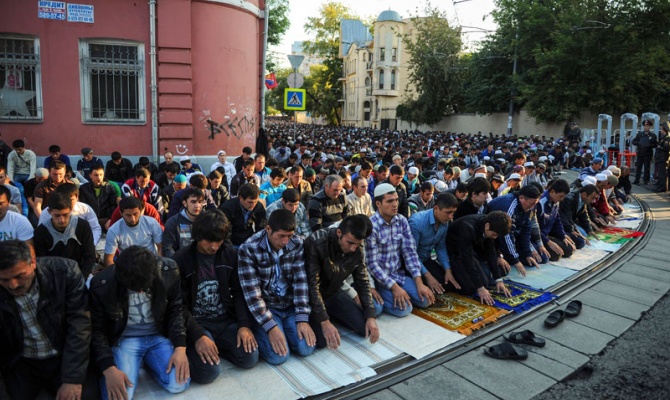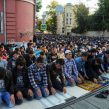
Moscow Remains Fertile Recruiting Ground for Aspiring Jihadists
Publication: Eurasia Daily Monitor Volume: 12 Issue: 41
By:

From time to time, Russia is forced to reveal information about the real situation involving the jihadist movement in the Russian capital. Authorities are not keen on providing figures on how many Moscow residents are Muslims to avoid traumatizing the Russian Orthodox residents. According to some, possibly biased, estimates, about a million Moscow residents may be Muslims (Muslim.ru, accessed March 5). In any case, the Muslims of Moscow are perhaps the largest group of Muslims concentrated in any Russian city. This has an impact of its own. With so many Muslims around, Moscow has only six official mosques; there are many premises that are used as mosques, but they are temporary. This is why Muslims in Moscow often end up praying in inappropriate buildings. This, in turn, prompts the police and the security services to regard them as sectarians and adherents of unofficial Islam, which automatically puts them in the category of potential terrorists.
The Russian Ministry of Interior recently charged 14 Chechens and Dagestanis arrested in Moscow with terrorism. According to the investigators, they were preparing bomb attacks and had ties to the organizers of the terrorist attacks in Volgograd, in December 2013 (Inforos.ru, February 26). According to the police, the suspects amassed an entire cache of weapons, including two RGD-5 hand grenades, two F-1 hand grenades, homemade hand grenades, an improvised explosive device (IED) in the form of a so-called shahid belt, TNT blocks, a large number of detonators, electrical detonators, and a gun (Rosbalt.ru, February 26).
Investigators think that all suspects are adherents of “radical Islamic teachings” and the idea of “armed jihad.” While according to some reports, all the suspects were placed under arrest, in reality, only seven of the suspects were placed under arrest and the other seven received other restrictions imposed by the court that did not require them to remain in police custody (Grani.ru, February 26). All the suspects were detained during a police operation at a Moscow building back in November 2013, when the Russian police was implementing preventive measures in the run-up to the 2014 Winter Olympics in Sochi. The authorities alleged that all those arrested belonged to al Takfir wal-Hijra, a Muslim organization that is banned in Russia (Kommersant, November 29, 2013). The Russian government was unfazed by the fact that this organization is not typical of terrorist groups. Members of al Takfir wal-Hijra are considered to have been misled, since they regard as infidels not only all people who are not Muslims, but also all Muslims who do not share their religious views (Tvrain.ru, November 27, 2013).
The government’s attempt to attribute a planned terrorist attack to such an exotic Islamic movement raises questions about the actions of the Russian interior ministry. Investigators eventually dropped the primary accusation, and the cache of weapons was not used as evidence to implicate the suspects in a terrorist plot. The arms cache, much advertised at the time of the arrest, now is only considered for possible charges of illegal arms possession and arms trading on Russian territory. The government is currently recasting the suspects from a group of jihadists to a group of hostile ideologues who were not preparing a terrorist attack. It is unclear how the investigators dealt with the shahid belt, which was considered the main proof of the suspects’ terrorist intentions. This case shows how criminal cases are sometimes fabricated in Russia. The government evidently needed to showcase the disruption of a jihadist ring and even made up a connection between the suspects and the terrorist attacks in Volgograd on December 29, 2013 (Fn-volga.ru, February 26).
The fact that the investigation progressed to the stage of formally bringing charges against the suspects 15 months after their arrest indicates that officials could not simply drop the unjustified charges and quietly close the case. Now, investigators will have to take the case to court, where it will look comical. Still, this does not guarantee that the court will side with the suspects. Courts in Russia are only a connecting link between the authorities and the investigators.
At the same time, this does not appear to have been an isolated incident. News about jihadists in Moscow appears on regular basis. For example, on February 25, Russian media outlets reported that Moscow police detained a man who created and managed an Internet website on behalf of militants from the terrorist organization the Islamic State (Lenta.ru, February 25). According to the investigators, the suspect posted extremist content and “called for terrorist activity and public justification of terrorism.” The fact that he was a citizen of Tajikistan produced even more outrage among Russians toward Central Asian migrants.
Moscow’s main problem is that it does not understand who it is fighting. Sometimes, organizations that are fairly harmless end up on the list of outlawed groups in Russia. Most often, people in Moscow are detained for alleged membership in the Hizb ut-Tahrir organization. If membership in the organization is proven, the person ends up in a Russian prison (slon.ru, February 5). In any case, judging by how regularly the law enforcement authorities detain dozens of suspected members of this Islamic organization, it can be assumed that it has resources. Moscow equates Hizb ut-Tahrir with the Islamic State even though the two organizations are implacable enemies.
Moscow is afraid to remain alone in its fight against the jihadists. The visit of Federal Security Service (FSB) Director Alexander Bortnikov to Washington, DC, in February is a vivid indication of that (Echo.msk.ru, February 20). Moreover, a recent media campaign showcasing the jihadist threat to Russia may be a signal to the West that Russia has the same problems as other countries and is prepared for close cooperation and information exchange with them. At the same time, however, it cannot be ruled out that Russia is holding behind-the-scenes talks with the jihadists on an alliance against the United States and the West.




